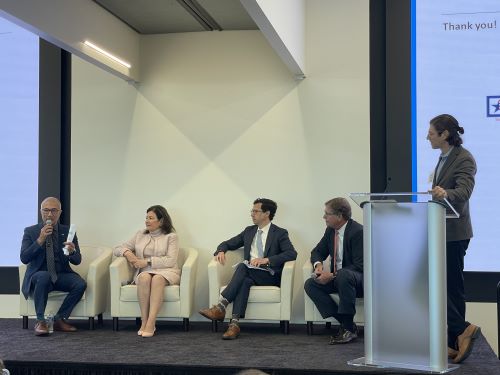Ali Noorani's Immigration Notes: Primary Day
 The following immigration notes are from Ali Noorani, Executive Director of National Immigration Forum.
The following immigration notes are from Ali Noorani, Executive Director of National Immigration Forum.
A few weeks back I wrote about how Romney-Clinton voters, turned off by Trump’s action on immigration, were poised to influence districts like the Texas 7th. Today is primary day in Texas. Who turns out for whom will start to tell us how immigration is going to impact the November elections.
Welcome back to the Tuesday edition of Noorani’s Notes.
A HOOSIER FLIP – Circling back to an issue we wrote about recently: the Indiana House passed legislation Monday, 88-8, allowing DACA participants in the state to “once again seek professional licenses for scores of occupations in Indiana.” While the administration of Governor Eric Holcomb recently started screening out DACA recipients through a change in the application form used by the Indiana Professional Licensing Agency – which would impact 9,000 Dreamers in Indiana – Holcomb is supporting the legislative effort. It’s now on to the state Senate. Watch Senator Mike Delph, author of the original 2011 legislation
COURTS – A federal judge turned down California’s request to immediately halt the Trump administration’s policy of punishing so-called sanctuary cities by withholding grant dollars. “U.S. District Court Judge William Orrick did not rule out eventually deciding the case in the state's favor,” but he did say that the issues were murky and required further review. At issue is Attorney General Session’s plans to enforce a 1996 law, Section 1373, requiring local and state officials to cooperate with requests for information about the immigration status of individuals they encounter. Key line from the ruling, “The federal government has authority to set immigration policy. But where that policy collides with the State’s constitutional police powers, it is important to understand the parameters of the federal government’s interpretation of Section 1373."
FEAR – Two recent studies found President Trump’s immigration policies and rhetoric are creating real distress for people. Of the parents surveyed, a third were undocumented, a sixth had temporary protected status, a third were green card holders, and a sixth were U.S. citizens. The findings: across the board, parents feared family separation, they were concerned about their children finishing school, and perhaps the most disheartening response: 62% said they’d often avoided medical care, police, or other services. Another interesting finding: the parents of U.S. citizens “were just as likely to tell their children to stay away from authorities and change their routines as parents of noncitizens, even though citizen teenagers wouldn’t be at risk of getting turned over to ICE.” America is better than this.
ESCAPING FEAR – El Salvador has some of the highest rates of violence against women and girls, with the third highest violent death rate for women in the world. Rival gangs use sisters and daughters as “objects of vengeance.” In 2016, 524 women in El Salvador – one in every 5,000 – were killed, with most of them under the age of 30. The only option some women have is to escape, but President Trump’s policies are making it harder for these women to come to the U.S. and seek asylum.
THANKS FOR YOUR SERVICE – Immigrant recruits who were promised expedited citizenship in return for their service are facing yet another hurdle. The USCIS offices at basic training locations have been closed since late January, preventing recruits from receiving fast-track citizenship. The problem: “When they graduate basic training but don’t gain their citizenship, they are unable to work legally in the U.S. or leave the country. Many are at risk of deportation. They also can't file visa petitions to legalize their spouses and children until they are U.S. citizens.” And then in some instances, these recruits can’t even deploy with their units.
I’M A DREAMER – There still is anxiety, uncertainty, and urgency for Dreamers – like Leezia Dhalla who wrote about her experience in the Washington Post. “My employer will have to let me go; I won’t have a way to pay my rent; my family and friends will be inconsolable, knowing that I can be deported at any time. They’re the ones whose lives will be disrupted, alongside mine, if I’m deported to a country I barely remember.”








